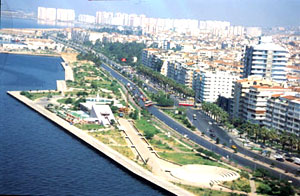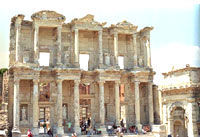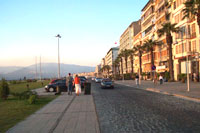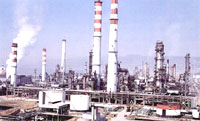

"Beautiful Izmir" - the "Pearl of the Aegean" - is Turkey's third largest city and second most important port. A city of palm-lined promenades, avenues and green parks set in sweeping curves along a circular bay, Izmir has an exceptionally mild climate and many fine hotels. The city is a busy commercial and industrial center as well as the gateway to the Aegean Region. Turkey's Aegean shores are among the loveliest landscapes in the country. The magnificent coastline, lapped by the clear water of the Aegean Sea, abounds in vast and pristine beaches surrounded by olive groves, rocky crags and pine woods. Dotted with idyllic fishing harbors, popular holiday villages, and the remains of ancient civilizations, this region offers an exceptionally attractive venue for meetings, incentives and conferences.
History
Known as "Smyrna" in ancient times, the province of Izmir has a long history, dating back to the 3rd millennium BC when it was one of the most advanced cultural centers in Western Anatolia. Legendary Homer lived here in the lonian period, which was the most splendid age of the city, dating to the 1st millennium BC. Today some beautiful examples from this long past can be found inside the city. Here is the Kadifekale (the Velvet Fortress) located on Mount Pagos, overlooking the area. A marvelous view of the Gulf of Izmir is provided from this castle built in the 3rd century BC, and later restored at various times. Another important sight is the Roman agora, constructed during one of the most brilliant periods of the province. The seven churches mentioned by St. John in the Book of Revelation are also in Turkey and are spread around Izmir, which are Izmir (Smyrna), Efes (Ephesus), Eskihisar (Laodicea), Alasehir (Philadelphia), Sart (Sardis), Akhisar (Thyatira), and Bergama (Pergamum).
 Besides these, the history of Turkey tells of a 10,000 year old civilization. Anatolia is a melting pot where cultures from Sumer, Babylon and Assyria interacted for centuries with peoples such as the Hattis, Hittites, Hourrites. The result was a unique Anatolian civilization, which has long inspired the thoughts and legends of the West. Among these civilizations, Troy, The Hittites, The Mitanni Kingdom, The Urartian States, The Phrygians, The Lydians, The Romans and Byzantium Empire, The Seljuk Sultanate and The Ottoman Empire can be counted, many of which has city remains around the Aegean Region. These ancient cities famous for their theaters, temples, agoras and fortresses are encountered at every step taken in the region, which has lived intimately with innumerable mythological subjects for centuries. These cities constituted the foundation of the Western civilization with their successful performances realized in the tunnel of time in the fields of city planning, philosophy, medicine, mathematics, astronomy, architecture and art. Besides these, the history of Turkey tells of a 10,000 year old civilization. Anatolia is a melting pot where cultures from Sumer, Babylon and Assyria interacted for centuries with peoples such as the Hattis, Hittites, Hourrites. The result was a unique Anatolian civilization, which has long inspired the thoughts and legends of the West. Among these civilizations, Troy, The Hittites, The Mitanni Kingdom, The Urartian States, The Phrygians, The Lydians, The Romans and Byzantium Empire, The Seljuk Sultanate and The Ottoman Empire can be counted, many of which has city remains around the Aegean Region. These ancient cities famous for their theaters, temples, agoras and fortresses are encountered at every step taken in the region, which has lived intimately with innumerable mythological subjects for centuries. These cities constituted the foundation of the Western civilization with their successful performances realized in the tunnel of time in the fields of city planning, philosophy, medicine, mathematics, astronomy, architecture and art.
Culture
Izmir is located at the most western part of Turkey and as a result of this geographical position a western style of life is combined with Turkish customs and habits. This modern city still retains traces of its ancient, Ottoman and Levantine past. Being the hub of the Levantine community, Izmir has long been a center of culture and civilization where Judaism, Christianity and Islam have always co-existed peacefully. Therefore, Izmir enjoys a reputation as a cosmopolitan city of culture.
 Once the ancient city of Smyrna, it is now a modern, developed, and busy commercial center, set around a huge bay and surrounded by mountains. The broad boulevards, glass-fronted buildings and modern shopping centers are dotted with traditional red-tiled roofs, the 18th century market, and old mosques and churches, although the city has an atmosphere more of Mediterranean Europe than traditional Turkey. The long attractive palm-fringed promenade, Birinci Kordon, which stretches the entire length of the city up to the Alsancak Ferry Terminal, is a popular spot for evening walks, and there are many cafes along the waterfront. Once the ancient city of Smyrna, it is now a modern, developed, and busy commercial center, set around a huge bay and surrounded by mountains. The broad boulevards, glass-fronted buildings and modern shopping centers are dotted with traditional red-tiled roofs, the 18th century market, and old mosques and churches, although the city has an atmosphere more of Mediterranean Europe than traditional Turkey. The long attractive palm-fringed promenade, Birinci Kordon, which stretches the entire length of the city up to the Alsancak Ferry Terminal, is a popular spot for evening walks, and there are many cafes along the waterfront.
Izmir has a good selection of culture and entertainment, from the Archaeological and Ethnographic Museums, to the Izmir State Opera and Ballet and Izmir State Symphony Orchestra, to the many bars and clubs. The cosmopolitan and lively city gets even busier during the International Izmir Festival (mid-June to mid-July) with music and dance, with performances also in nearby Cesme and Ephesus.
Economic Activities
 The Aegean Region is in second place after the Marmara Region in industrial activities. Textiles, food and automotive industries are in the lead, with machinery, spare parts and other industrial organizations concentrated in Izmir, the oil industry is concentrated around Edremit and Ayvalik. There are sugar factories in Usak, Kutahya and Afyon, and nitrogen factories in Kutahya. Besides Izmir, cotton textiles are widespread in Usak, Aydin, Nazilli, and especially in Denizli. Denizli is the most important textiles center in the region and they are exported from here. Carpet weaving is developed in Usak, Kula, Gordes, Simav and Demirci in the Inner Western Anatolia sections. Afyon is known for its marble and marble production facilities. The Camalti Saltern is the most important salt production center in Turkey. The region contributes to the electricity production in Turkey through thermal power plants in Soma, Tuncbilek and Yatagan, and hydroelectric power plants in Kemer and Demirkopru. There is a large oil refinery at Aliaga near Izmir. The Aegean Region is in second place after the Marmara Region in industrial activities. Textiles, food and automotive industries are in the lead, with machinery, spare parts and other industrial organizations concentrated in Izmir, the oil industry is concentrated around Edremit and Ayvalik. There are sugar factories in Usak, Kutahya and Afyon, and nitrogen factories in Kutahya. Besides Izmir, cotton textiles are widespread in Usak, Aydin, Nazilli, and especially in Denizli. Denizli is the most important textiles center in the region and they are exported from here. Carpet weaving is developed in Usak, Kula, Gordes, Simav and Demirci in the Inner Western Anatolia sections. Afyon is known for its marble and marble production facilities. The Camalti Saltern is the most important salt production center in Turkey. The region contributes to the electricity production in Turkey through thermal power plants in Soma, Tuncbilek and Yatagan, and hydroelectric power plants in Kemer and Demirkopru. There is a large oil refinery at Aliaga near Izmir.
 Cultivated and planted lands cover a large area in the Aegean Region. Fruits and vegetables are important in the Inner Western Anatolia section. More than half of Turkey's tobacco production comes from the Aegean Region. The share of the region in the total production of cotton in Turkey is close to one-third. The seedless grapes, figs, and the oil and olive oil production contribute considerably to the economy of the region. Cultivated and planted lands cover a large area in the Aegean Region. Fruits and vegetables are important in the Inner Western Anatolia section. More than half of Turkey's tobacco production comes from the Aegean Region. The share of the region in the total production of cotton in Turkey is close to one-third. The seedless grapes, figs, and the oil and olive oil production contribute considerably to the economy of the region.
The Aegean Region is the most active and important area for the shipping sector and port operations. The sea and shore area are authorized and controlled by the Undersecretariat of Marines. There are four main trade ports in this region - the ports of Aliaga, Cesme, Dikili and Izmir. However, Izmir is the main port of the region. Almost 20% of the national exports are serviced by the busy seaport of Izmir. The yearly loading capacity of 7 million tons will reach 11 million tons by the year 2005.
The Aegean Free Zone operating in the district of Gaziemir is the most successful free zone in Turkey with a trade volume of 1,2 billion dollars. It is located just 4 km. from Izmir International Airport and 12 km. from the Port of Izmir. It is the only production-oriented free zone in Turkey. The major industries in the free zone are electronics, automotive, high technology products, food and packaging, textiles and machinery. Among the top 100 Turkish industrial companies 6 of them are Aegean firms. Among the top 500, 77 are Aegean.
The multinational giants like General Motors, Philip Morris, RJ Reynolds, Citibank, FTC / Lockheed, Delphi (USA), Samsung (S. Korea), Karstadt and Hugo Boss (Germany), Akzo Nobel and AVEBE (Holland), ELDOR (Italy), ABB and Volvo (Sweden) located their investments and businesses in Izmir. In this decade, the considerable advantages of Izmir have encouraged foreign investors to take a place in this re-emerging city. In particular, food products, construction materials, textile products, forest products and furniture, chemicals, agricultural products and trade of these products accelerate the commerce in Izmir. Besides this, Izmir taking leaps forward in the industrialization process attracts investment in the sectors of tobacco, automotive, textile, electric - electronics and food. In the Aegean Region where over 6,000 industrial companies operate, some 4,000 are located in Izmir. In the same way, of the 40 industrial zones, which are active and are still being invested upon, 14 are in the province of Izmir.
In addition to these, Izmir International Fair is held in Izmir for 72 years, which is one of the most renowned general trade fairs, and had a great achievement with the rise of the number of domestic and international exhibitors. The Izmir International Fair has established itself as a premier showcase of Turkey since the first arrangement. Although the general trade fairs have become unpopular due to the rising interest in the specialized fairs, the Izmir International Fair has been protecting its significance by means of the renovations in the concept.
Tourism is also very developed in the Aegean Region. It contributes considerably to the economy of the region. Throughout the Aegean shores which have "the most beautiful skies and the best climate in the world" (according to the famous historian Herodotus of Bodrum) bays, peninsulas, coves, islands and fine sandy beaches follow one another.
Climate
 People coming to Izmir can expect long, hot summers and mild, rainy winters. The total precipitation for Izmir averages 27.8 inches per year; however, 77% of that falls during November through March. People coming to Izmir can expect long, hot summers and mild, rainy winters. The total precipitation for Izmir averages 27.8 inches per year; however, 77% of that falls during November through March.
The average maximum temperatures during the winter months range between 50° F and 40° F. Although it's rare, snow has been recorded in Izmir in January and February. Occasionally, temperatures will drop into the low 20s, but these periods only last one to two days.
The summer months -June through September- bring average daytime temperatures of 86° F or higher, sometimes reaching 100-plus degrees. Nighttime lows are frequently above 70° F. Many people install fans or air conditioners to cool their apartments. Rain is extremely rare in the summer and you may have to undergo water rationing before the rains come in the fall.
|